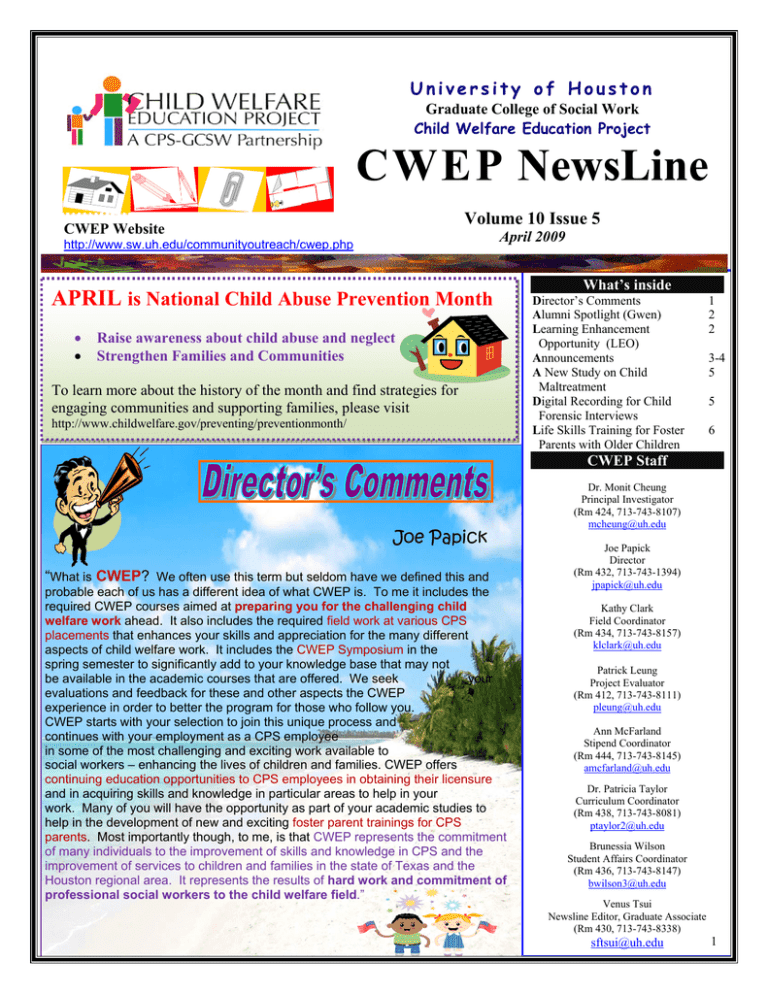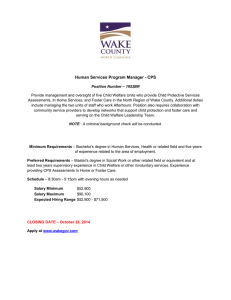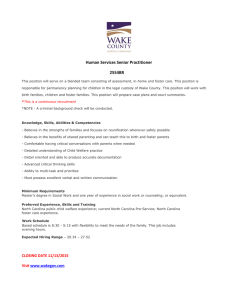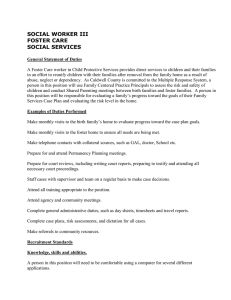Document 14208182
advertisement

University of Houston
Graduate College of Social Work
Child Welfare Education Project
CWEP NewsLine
Volume 10 Issue 5
CWEP Website
April 2009
http://www.sw.uh.edu/communityoutreach/cwep.php
APRIL is National Child Abuse Prevention Month
•
•
Raise awareness about child abuse and neglect
Strengthen Families and Communities
To learn more about the history of the month and find strategies for
engaging communities and supporting families, please visit
http://www.childwelfare.gov/preventing/preventionmonth/
What’s inside
Director’s Comments
Alumni Spotlight (Gwen)
Learning Enhancement
Opportunity (LEO)
Announcements
A New Study on Child
Maltreatment
Digital Recording for Child
Forensic Interviews
Life Skills Training for Foster
Parents with Older Children
1
2
2
3-4
5
5
6
CWEP Staff
Joe Papick
“What is CWEP? We often use this term but seldom have we defined this and
probable each of us has a different idea of what CWEP is. To me it includes the
required CWEP courses aimed at preparing you for the challenging child
welfare work ahead. It also includes the required field work at various CPS
placements that enhances your skills and appreciation for the many different
aspects of child welfare work. It includes the CWEP Symposium in the
spring semester to significantly add to your knowledge base that may not
be available in the academic courses that are offered. We seek
your
evaluations and feedback for these and other aspects the CWEP
experience in order to better the program for those who follow you.
CWEP starts with your selection to join this unique process and
continues with your employment as a CPS employee
in some of the most challenging and exciting work available to
social workers – enhancing the lives of children and families. CWEP offers
continuing education opportunities to CPS employees in obtaining their licensure
and in acquiring skills and knowledge in particular areas to help in your
work. Many of you will have the opportunity as part of your academic studies to
help in the development of new and exciting foster parent trainings for CPS
parents. Most importantly though, to me, is that CWEP represents the commitment
of many individuals to the improvement of skills and knowledge in CPS and the
improvement of services to children and families in the state of Texas and the
Houston regional area. It represents the results of hard work and commitment of
professional social workers to the child welfare field.”
Dr. Monit Cheung
Principal Investigator
(Rm 424, 713-743-8107)
mcheung@uh.edu
Joe Papick
Director
(Rm 432, 713-743-1394)
jpapick@uh.edu
Kathy Clark
Field Coordinator
(Rm 434, 713-743-8157)
klclark@uh.edu
Patrick Leung
Project Evaluator
(Rm 412, 713-743-8111)
pleung@uh.edu
Ann McFarland
Stipend Coordinator
(Rm 444, 713-743-8145)
amcfarland@uh.edu
Dr. Patricia Taylor
Curriculum Coordinator
(Rm 438, 713-743-8081)
ptaylor2@uh.edu
Brunessia Wilson
Student Affairs Coordinator
(Rm 436, 713-743-8147)
bwilson3@uh.edu
Venus Tsui
Newsline Editor, Graduate Associate
(Rm 430, 713-743-8338)
sftsui@uh.edu
1
This month we are highlighting
Gwen Carter,
LMSW
1. What is your current position?
Public Information for the Texas Department of Family and Protective Services in
Region 6 (Adult Protective Services, Child Protective Services and Child Care Licensing).
2. What did you like most about the CWEP program?
The ongoing support I received from CWEP staff and the GCSW. I always felt that whatever I needed to
help me be successful in graduate school, was readily available. I also had the opportunity to meet some
amazing people.
3. How did CWEP prepare you for your job?
I feel more comfortable with my writing skills and in making presentations.
The whole experience taught me a lot about working with others and the foundations
of Social Work Practice.
4. Do you have any advice for current CWEP students?
Take full advantage of the support that is provided for you during this time. Take time to enjoy these
experiences and know that they will not only help you be a better Social Worker but a better person.
5. What are your plans for the future?
Watch my children grow up, strengthen my faith, continue to help others,
become a published author and someday pursue a PhD.
Many Thanks to GWEN!
L.E.O.
Learning Enhancement Opportunity
Corrine Walijarvi, LEO Mentor for CWEP
Your LEO Mentor is here to help you!
When you want to get a third-person perspective about your academic preparation, or when you need someone to go over your
presentation outline or paper format, please email or see Corrine Walijarvi, your LEO mentor for CWEP students.
Corrine writes, “My name is Corrine Walijarvi, and I am a first year student in the Ph.D. program at GCSW. I just received my
MSW at GCSW last May, after completing four years in the program as a part-time student. I received my undergraduate degree in
economics from Harvard, and worked as a public accountant while earning my M.S. in Accounting degree from New York
University. I then earned an MBA from Harvard Graduate School of Business Administration, and pursued a management career
while working for General Motors and General Electric…I am currently working as a Doctorate Research Assistant with Dr. Monit
Cheung. I am looking forward to the opportunity to help students currently in the CWEP program; I hope I can help you achieve
your goals while avoiding unnecessary stress!”
Corrine’s office hours: Wednesday from 12 noon to 5pm (Spring 2009), and Available in the Summer by Email.
Feel free to email Corrine any time at cmwalija@mail.uh.edu to ask any questions related to your academic preparation, or to
confirm a specific time for meeting with her. She looks forward to meeting with you in Room 429 and helping in any way that she
can. Remember, your LEO mentor is available for CWEP students only.
Dr. Monit Cheung, P.I. of CWEP
22
CWEP Symposium
Dr. Monit Cheung (left) &
Dr. Jean Latting (right)
CWEP Symposium was held on Friday, March 13, 2009.
Dr. Jean Kantambu Latting, Professor Emeritus at the
Graduate College of Social Work, University of Houston,
was invited to conduct a workshop entitled “Leadership
Dynamics and Organizational effectiveness: An Interactive
Workshop.”It was excellent!!
A total of 28
people attended!
Christine Smith ($15,000) Graduate Studies Scholarship
SCHOLARSHIP in Children and Family Studies
The Educational Foundation, IOOF, with funding from the estate of Christine Smith and the
members of the Independent Order of Odd Fellows, has established the Christine Smith $15,000
Graduate Studies Scholarship for graduate level studies specializing in children and family issues.
If you will enroll in GCSW in Fall 2009 and Spring 2010, please email Dr. Monit Cheung at mcheung@uh.edu
for detailed information and application form.
To know more about the scholarship eligibility requirements, please visit CWEP website for current CWEP students or
click this link http://www.sw.uh.edu/communityoutreach/cwep_students.php and check “Scholarship Opportunity.”
Online Learning Modules on EBP & Cultural Competence in Child Welfare
This is a free online learning workshop! This workshop consists of six self-study modules
useful for students, workers, field instructors, supervisors and administrators who are
interested in improving practice and managing to achieve culturally competent, evidencebased practice. Through this self-guided series, this information is available to you!
•
•
•
•
•
•
Module 1: Introduction
Module 2: First Things First: Key Concepts of Evidence-Based Practice & Child Welfare
Module 3: First Things First: Key Concepts of Cultural Sensitivity
Module 4: Moving Along: Implementation So Far!
Module 5: Forward & Onward: Practice, Policy, and Research
Module 6: Until Next Time: Challenges, Next Steps & Conclusions
Please go to the website below to retrieve the modules developed by University of Minnesota.
http://cehd.umn.edu/ssw/G-S/EBP-CC_Modules/index.html
Essential Resources for CWEP Students
CWEP website provides you a lot of essential resources and information such as Manuscript Submission
Information, Questioning Techniques in Forensic Child Sexual Abuse Interviews, Scholarship Opportunity,
the LEO mentor program, APA citation format, CWEP library catalog, NewsLine, etc.
Please go to CWEP website at http://www.sw.uh.edu/communityoutreach/cwep.php and click on CWEP current students
and National Title IV-E Resources to get these useful resources.
3
Strengthening Families and Communities, Preventing Abuse:
2009 Resource Guide
Order your FREE
copies Today!
Developed for service providers, the guide:
• Highlights strategies to strengthen families by promoting key protective factors that prevent
child abuse and neglect
• Includes tip sheets in both English and Spanish to share with parents.
The guide can be downloaded or ordered at http://www.childwelfare.gov/preventing/res_guide_2009/,
or contact Child Welfare Information Gateway at 1.800.394.3366 or info@childwelfare.gov
New Deadline for Adoption Excellence Awards Submissions
Nominations by Friday, May 22, 2009
The U.S. Department of Health and Human Services (USDHHS) invites you to
nominate candidates for the 2009 Adoption Excellence Awards (self-nominations
will be accepted). Guidelines, nomination form, and information about past
recipients are located at:
www.acf.hhs.gov/programs/cb/current_initiatives/aeawards.htm
Please take a few minutes to recognize a person or program that has shown
dedication, innovation, and accomplishment in providing safe, permanent, loving
homes for America’s waiting children.
ChildFirst: A Quarterly Forensic Interviewing Newsletter
ChildFirst is a quarterly forensic interviewing newsletter issued by the National
Child Protection Training Center. The first issue includes an article concerning the
selection of recording technology for child forensic interviews (see p.5).
To read or download a copy of the newsletter, please visit www.ncptc.org and click
on "publications."
Title IV-E Federal Region VI Roundtable
New Braunfels, Texas (May 28-29, 2009)
The 13th Annual Roundtable Conference will be presented by the Texas State University,
The Center for Children and Families, School of Social Work, and Texas Department of
Family and Protective Service.
For registration, please visit
http://www.ccf.txstate.edu/Projects/Current-Projects/Title-IV-E-Federal-RegionVI-Roundtable.html
National Child Welfare Evaluation Summit (Washington, D.C.)
(May 27-29, 2009)
Target Participants: Children’s Bureau discretionary grant evaluators, State and Tribal
child welfare administrators and analysts, evaluation experts in child welfare, evaluation
experts in other human service fields, and interested child welfare professionals.
For more information, please contact: evaluationsummit@pal-tech.com
4
Population-Based Prevention of Child Maltreatment:
The U.S. Triple P System Population Trial
By Prinz, R. J., Sanders, M. R., Shapiro, C. J., Whitaker, D. J., & Lutzker, J. R.
This is a new study (January, 2009), funded by the Centers for Disease Control and Prevention
(CDC), that indicates when parents have access to proven parenting interventions designed to address
problems all families face—from tantrums to encouraging good behavior --- key measures of child
maltreatment fall.
Support for families enrolled in the study came through the Triple P—Positive Parenting Program.
Using a multi-level, parenting, and family support strategy, this program aims to prevent behavioral,
emotional and developmental problems in children by enhancing the skills, knowledge and confidence of
parents. Triple P incorporates various support mechanisms for parents including local media, brief public
seminars, and parent consultation by specially trained providers in schools, churches, clinics, and community
centers.
According to researchers’ estimate on the basis of 100,000 children under age eight, the results found in
this study could translate annually into 688 fewer cases of child maltreatment, 240 fewer out-of-home placements
and 60 fewer children with injuries requiring hospitalization or emergency room treatment.
For the complete study, please visit the January 2009 online edition of Prevention Science at
http://www.springerlink.com/content/a737l8k76218j7k2/?p=587ecf68cf6745058cb3e636889cdf70&pi=0.
For details on the Triple P – Positive Parenting Program, visit www.triplep.net.
For information on CDC’s prevention research in child maltreatment, visit www.cdc.gov/injury.
A Forensic Interviewer’s Perspective on Digital Recording of Children
By Rita Johnson
In the U.S., there are over 700 Children’s Advocacy Centers (CACs) that facilitate collaborative
investigations and forensic interviews that are conducted in a neutral, child-friendly environment.
However, little has been known about the utilization of recording technology for child forensic
interviews. The article will discuss both benefits and pitfalls that technology offers.
Views from child protection professionals about recording child interview were divergent.
• Advantages: The recording “speaks for itself”; increases plea agreements; allows
protection for trained interviewer; obtains both audio and video; shows demeanor
of both child and interviewer; and provides evidence.
• Disadvantages: The recording will be “used” against the child in court; interviewer errors
may be over-emphasized in court; the state does not allow recordings to be used in the
judicial process; equipment problems; and poor quality audio and video.
Source: The full article can be found in the ChildFirst Spring 2009 Issue published by National Child Protection Training
Center. (http://www.ncptc.org/index.asp?Type=B_BASIC&SEC={F036F982-64E1-4093-A6936F89008B71D3}&DE={8F1CD4CB-689C-4DA5-818C-A243FAF1BEDC})
5
“Aging Out Without Doubt”:
Life Skills Training for Foster Parents with Older Children
by Julia Randle
There are more than 500,000 children and youth in foster care in the United States; approximately
20,000 youth “age out” or emancipate from foster care each year. Up to 50% of former foster/probation youth
become homeless within the first 18 months of emancipation. These kids are more likely to face
unemployment, incarceration, teen parenthood, and educational deficiencies. In the face of these grim
statistics, the University of Houston, along with CPS, sought to help curb these trends. The foster parent
training held on March 16, 2009, aimed to teach parents life skills to pass on to their foster youth to help
give them the competence to not only survive, but also succeed.
This training was designed by University of Houston graduate student Julia Randle under the
guidance of Dr. Patricia Taylor. Based on governmental research, areas covered in the curriculum included:
statistics of children in care and outcomes for youth aging out, adolescent development and impaired
development for abused youth, positive youth development, and life skills training. A dynamic group of
foster parents, ranging from 20 year veterans to a family still considering the process, brought their unique
insights to the group. Participants were provided a resource table including: pertinent CPS information,
community resources, college prep materials, and a book donated by selling author and television host
Chad Foster, Teenagers Preparing for the Real World. In addition to the lively discussion and activities,
the highlight of the evening was the vision board activity where participants identified goals
for their foster children and themselves. Foster parents left with greater knowledge about the
needs and realities of youth aging out of care, as well as with tools to help smooth that transition.
Julia Randle set up the resource table for foster
parents, including a generously donated book by
Chad Foster, Teenagers Preparing for the Real
World.
Students diligently work on vision boards,
which identify their goals for their foster
children, and/or themselves.
Foster parent, Babb, tells his
story to the group.
Feedback from Participants: i) Great presenter-comfortable atmosphere; great participants, ii) The picture
board was the anchor of the lessons and messages; iii) Everything was useful! iv) Great Class! v) Thank you Julia…
Foster parents work to identify myriad
foster child needs in this activity.
Prospective foster parent proudly shares
her plan to help children in need.
Training participant shares her
aspirations with the class.
6




